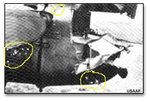I have experience with FMJ 8mm Mauser rounds shot through junkyard car fenders. The hole left is smaller than a dime. The tracer aspect makes no difference in entrance hole.
tom
Who ever talked about tracer rounds ? I've shot plenty 8mm FMJ rounds as-well, tracers and AP rounds alike. However we're talking about incendiary rounds here Tom, NOT tracers! The incendiary round have s small explosive filler in the nose, which on impact explodes and creates a big flash, causing more surface damage and allowing the pilot to better observe hits.






